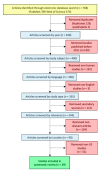Climate Change-Related Environmental Exposures and Perinatal and Maternal Health Outcomes in the U.S
- PMID: 36767030
- PMCID: PMC9914610
- DOI: 10.3390/ijerph20031662
Climate Change-Related Environmental Exposures and Perinatal and Maternal Health Outcomes in the U.S
Abstract
Purpose: Climate change poses one of the greatest risks to human health as air pollution increases, surface temperatures rise, and extreme weather events become more frequent. Environmental exposures related to climate change have a disproportionate effect on pregnant women through influencing food and water security, civil conflicts, extreme weather events, and the spread of disease. Our research team sought to identify the current peer-reviewed research on the effects of climate change-related environmental exposures on perinatal and maternal health in the United States.
Design and methods: A systematic literature review of publications identified through a comprehensive search of the PubMed and Web of Science databases was conducted using a modified Preferred Reporting Items for Systematic Reviews and Meta-Analyses (PRISMA) approach. The initial search across both databases identified a combined total of 768 publications. We removed 126 duplicates and 1 quadruplet, and the remaining 639 publications were subjected to our pre-set inclusion and exclusion criteria. We excluded studies outside of the United States. A total of 39 studies met our inclusion criteria and were retained for thematic analysis.
Findings: A total of 19 studies investigated the effect of either hot or cold temperature exposure on perinatal and maternal health outcomes. The effect of air pollution on perinatal outcomes was examined in five studies. A total of 19 studies evaluated the association between natural disasters (hurricanes, flash floods, and tropical cyclones) and perinatal and maternal health outcomes. High and low temperature extremes were found to negatively influence neonate and maternal health. Significant associations were found between air pollutant exposure and adverse pregnancy outcomes. Adverse pregnancy outcomes were linked to hurricanes, tropical cyclones, and flash floods.
Conclusions: This systematic review suggests that climate change-related environmental exposures, including extreme temperatures, air pollution, and natural disasters, are significantly associated with adverse perinatal and maternal health outcomes across the United States.
Keywords: air pollution; birth outcomes; climate change; mental health; natural disasters; perinatal and maternal health; temperature.
Conflict of interest statement
The authors declare no conflict of interest.
Figures
References
-
- Intergovernmental Panel on Climate Change (IPCC) Global Warming of 1.5 °C. An IPCC Special Report on the Impacts of Global Warming of 1.5 °C above Pre-Industrial Levels and Related Global Greenhouse Gas Emission Pathways, in the Context of Strengthening the Global Response to the Threat of Climate Change, Sustainable Development, and Efforts to Eradicate Poverty. 2018. [(accessed on 1 June 2022)]. Available online: https://www.ipcc.ch/sr15/
-
- Intergovernmental Panel on Climate Change (IPCC) Climate Change 2021: The Physical Science Basis. Contribution of Working Group I to the Sixth Assessment Report of the Intergovernmental Panel on Climate Change. 2021. [(accessed on 1 June 2022)]. Available online: https://www.ipcc.ch/report/sixth-assessment-report-working-group-i/
-
- Intergovernmental Panel on Climate Change (IPCC) AR5 Climate Change 2014: Impacts, Adaptation, and Vulnerability. North America. [(accessed on 10 January 2023)]. Available online: https://www.ipcc.ch/report/ar5/wg2/north-america/
-
- American College of Obstetricians and Gynecologists (ACOG) Position Statement: Addressing Climate Change. 2021. [(accessed on 1 June 2022)]. Available online: https://www.acog.org/clinical-information/policy-and-position-statements....
Publication types
MeSH terms
LinkOut - more resources
Full Text Sources
Medical
Miscellaneous


